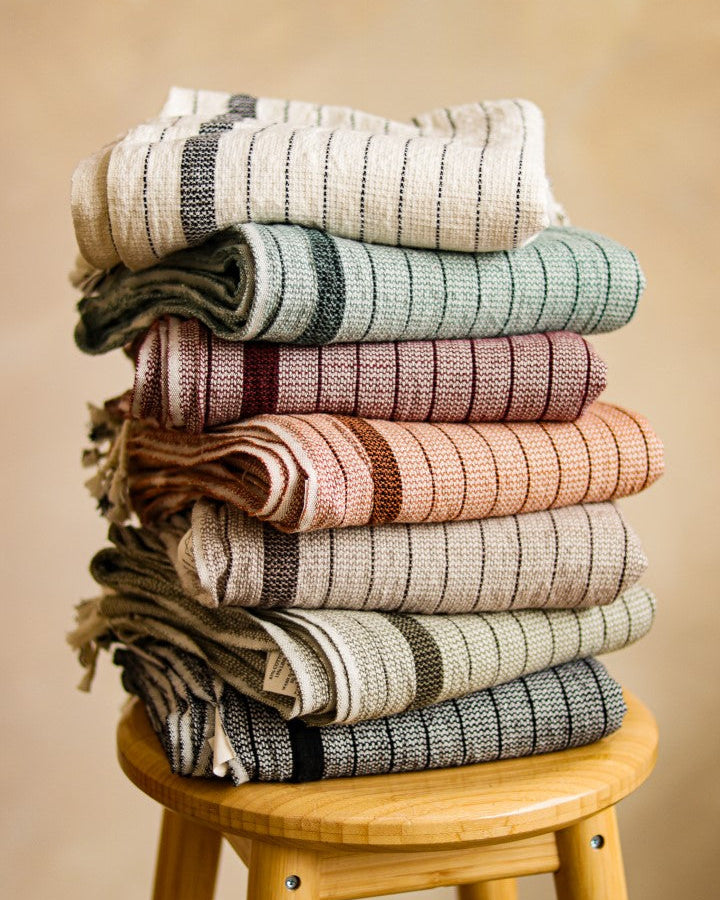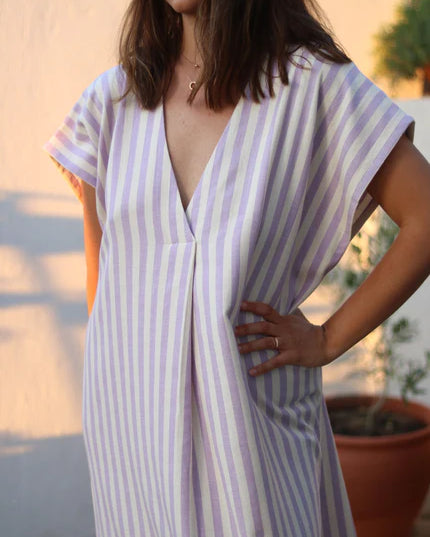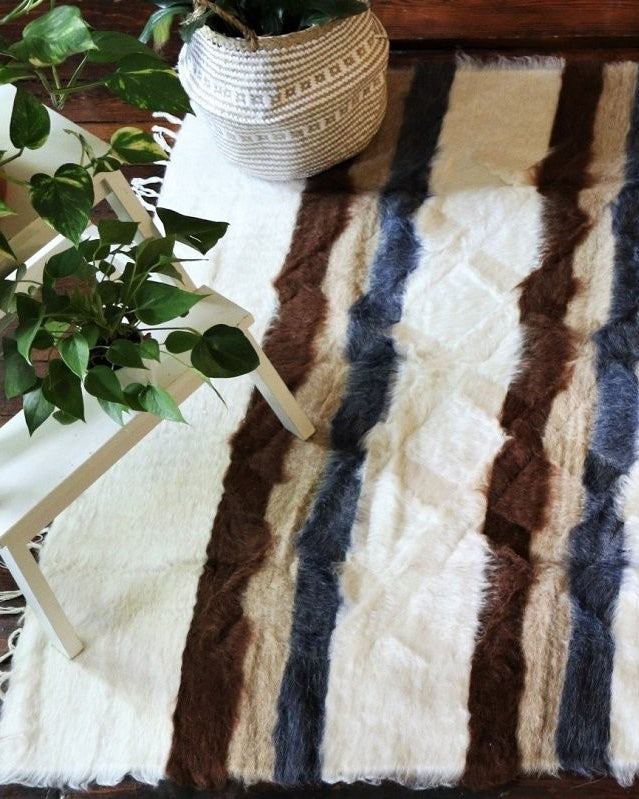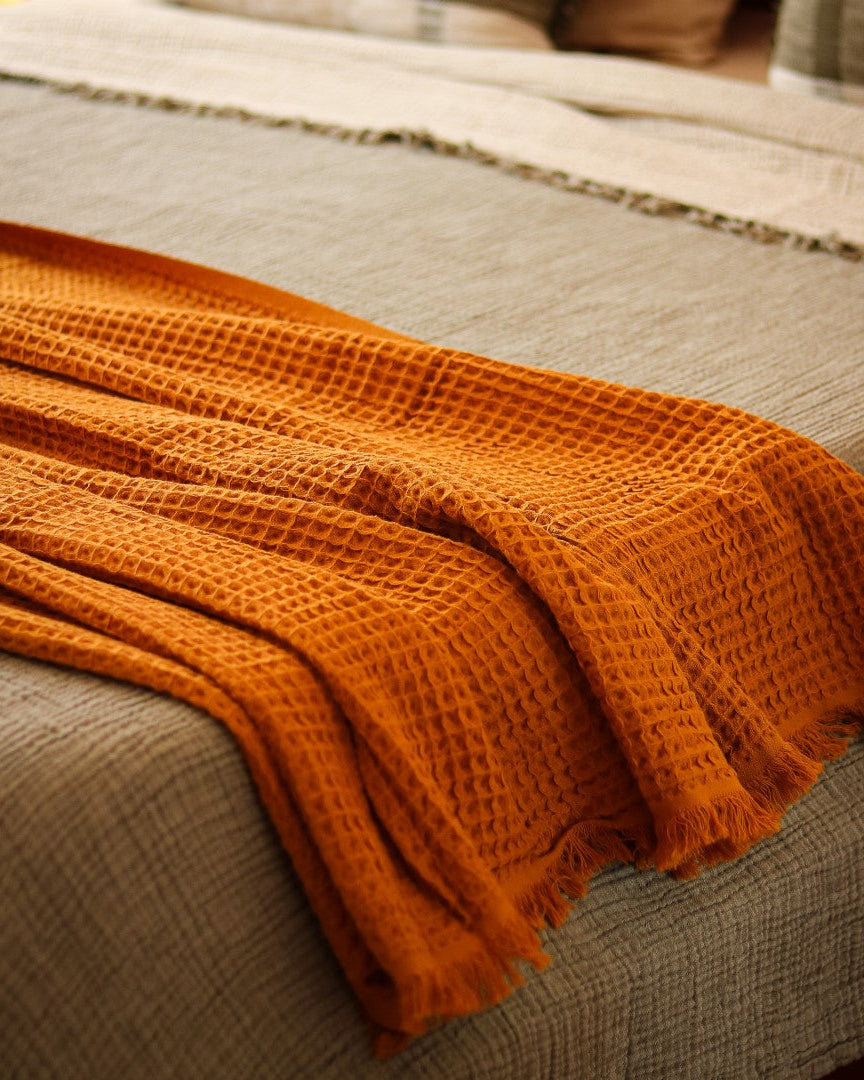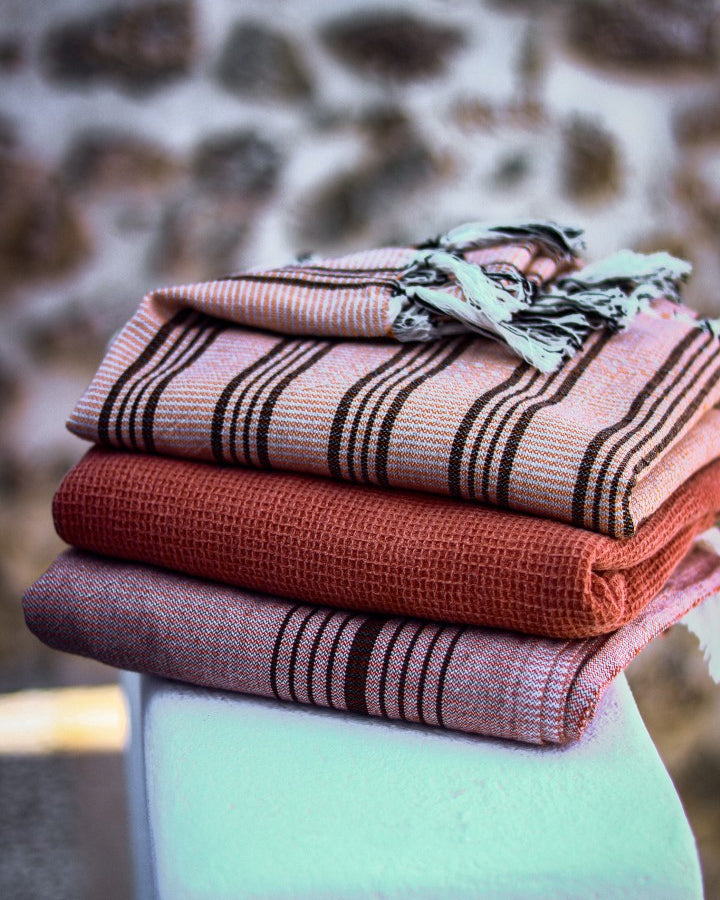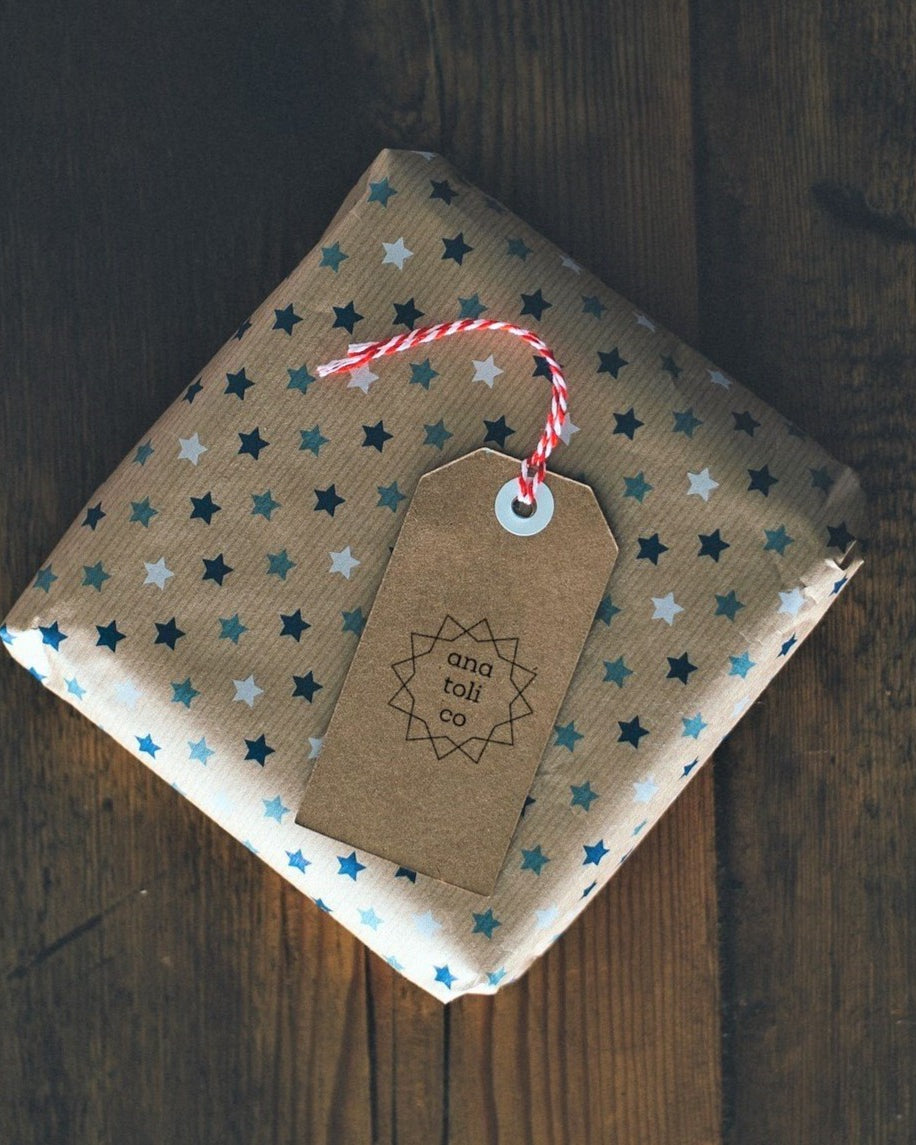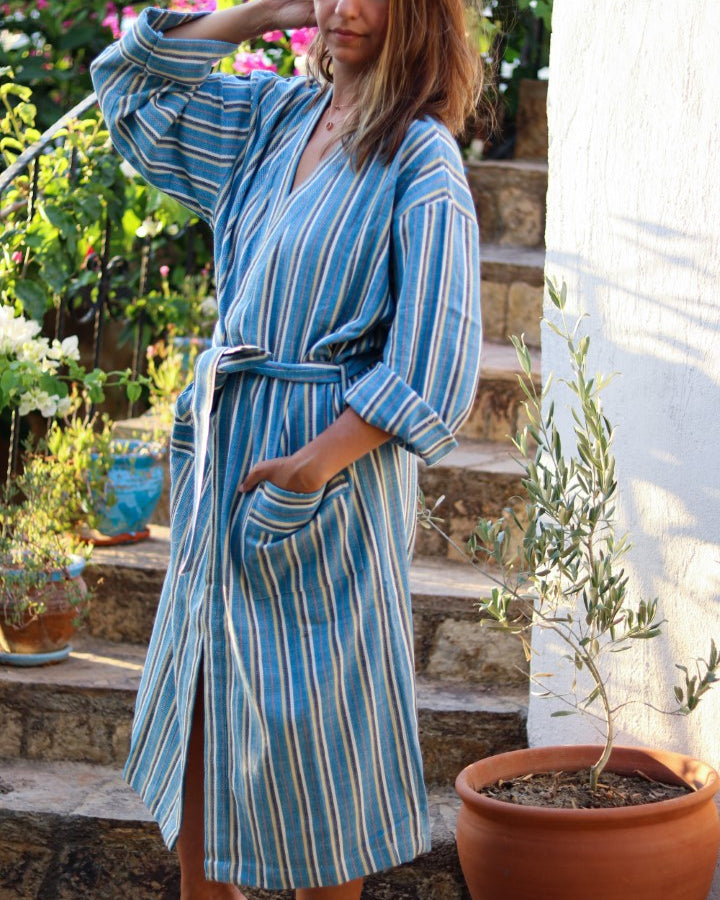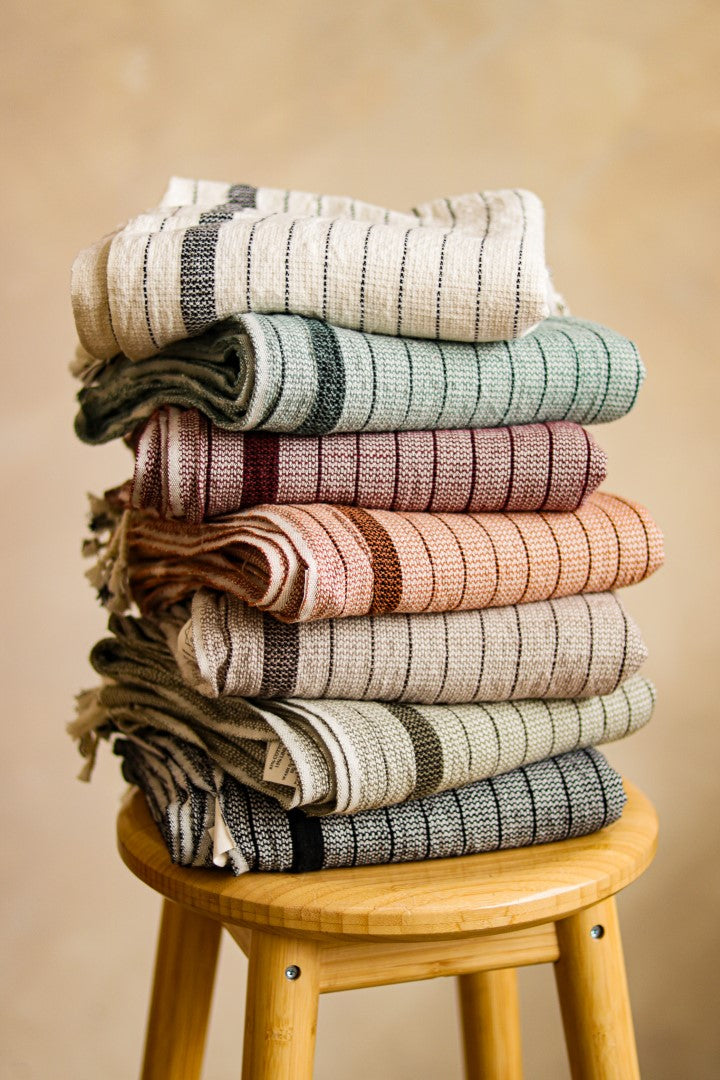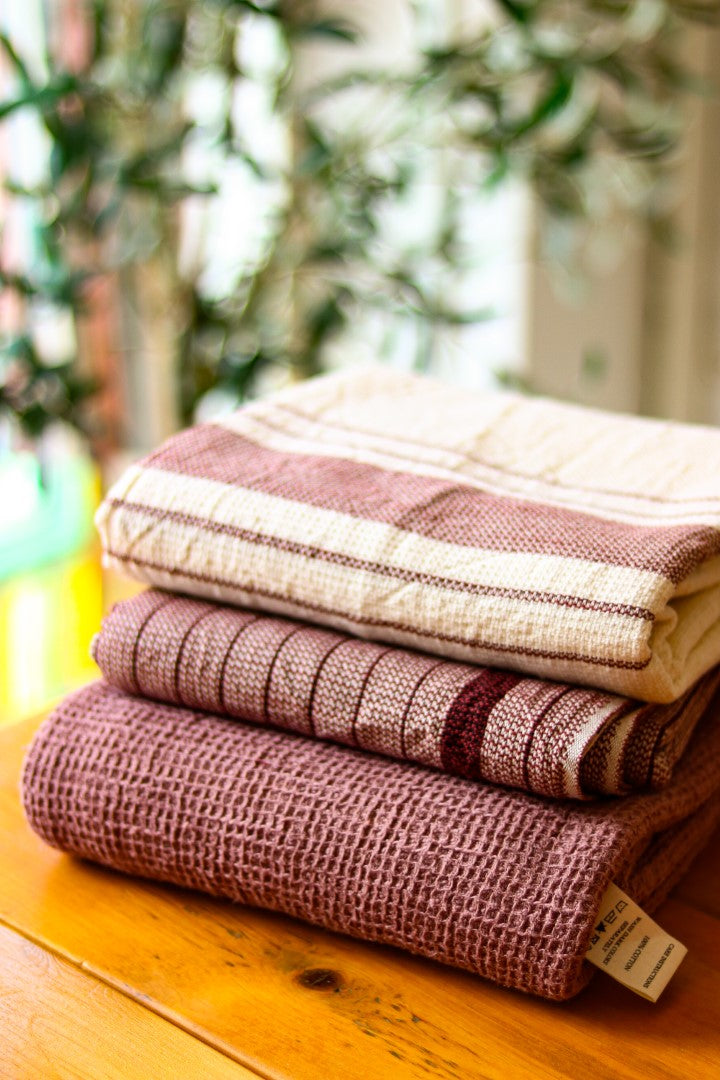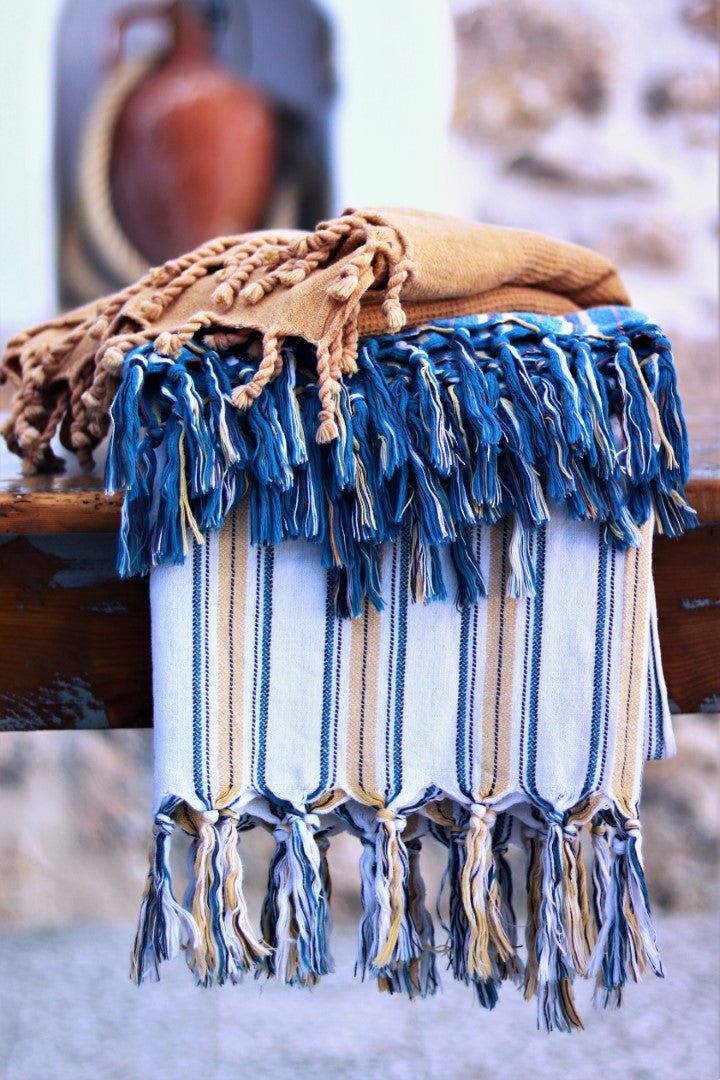When you start looking for the best organic cotton towels, you're doing more than just buying another bathroom accessory. You're making a conscious choice for better softness, incredible absorbency, and a product that's completely free from harsh pesticides and chemicals. It’s a small change that turns a simple daily routine into something far more thoughtful.
Why Choose Organic Cotton for Your Towels
There are few things better than stepping out of a warm shower and wrapping yourself in a plush, thirsty towel. But what if that simple luxury could be even better for you and the planet? That’s the promise of organic cotton. It elevates a basic household staple into a real statement of well-being and environmental care.
The biggest difference comes down to how the cotton is grown. Conventional cotton farming is notorious for its heavy use of chemicals; it's one of the most chemically-dependent crops on earth. Synthetic pesticides and fertilizers are the norm, and these substances can weaken the cotton fibers and even leave trace residues behind in the final product.
Organic cotton, on the other hand, is grown the old-fashioned way—using natural methods that build healthy soil, conserve water, and protect the surrounding ecosystem.
The Tangible Benefits in Your Bathroom
This cleaner, more natural approach to farming translates into benefits you can actually feel every single day. Because the cotton fibers aren't broken down by harsh chemicals, they grow longer and stronger. This results in towels that are just plain better.
- Exceptionally Soft: Those long, undamaged fibers create a towel that's naturally plusher and gentler on your skin. You'll often find they get even softer with every wash.
- Highly Absorbent: Healthy, long-staple cotton is a champion at soaking up moisture. These towels dry you off faster and more effectively than their conventional counterparts.
- More Durable: Stronger fibers mean your towel is built to last. It’s far less likely to thin out, fray, or lose its shape, giving you much better value over the long haul.
Choosing organic cotton is an investment in a product that is kinder to your skin. By eliminating exposure to residual pesticides and harsh processing agents, you create a healthier environment within your own home.
A Healthier Home and Planet
The positive impact of choosing the best organic cotton towels doesn't stop at your bathroom door. Organic farming practices often use significantly less water than conventional methods, which is a huge win for conserving a precious resource. If you want to dig deeper into the environmental side, you can learn more about how eco-friendly cotton can be when it's grown the right way.
This mindset can ripple through your entire home. When you start making eco-friendly choices for your home, whether it’s towels or kitchen cabinets, you're contributing to a healthier living space and a more sustainable world for all of us.
Getting a Feel for Towel Weave and Weight
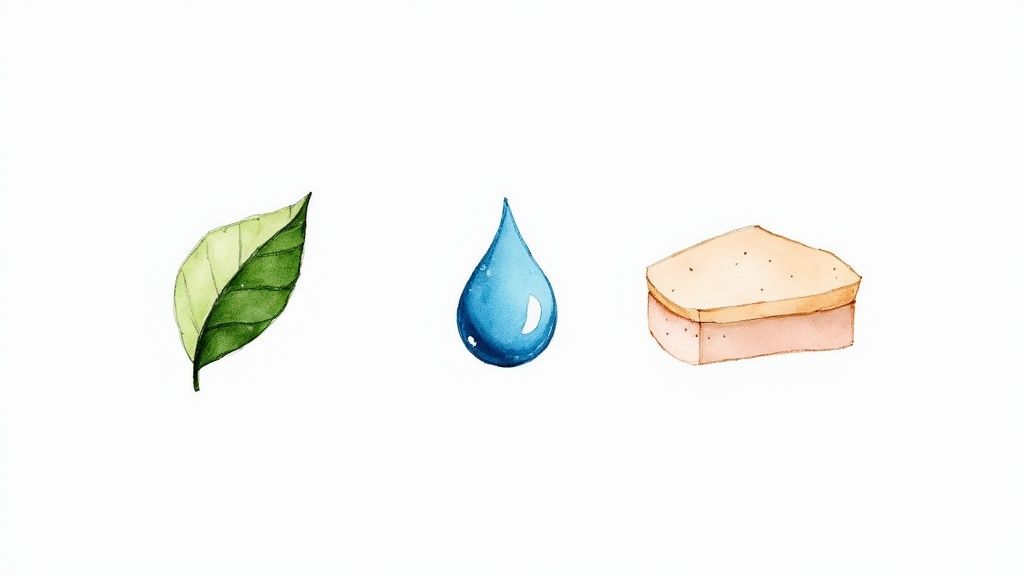
Have you ever wondered what separates a truly luxurious towel from one that feels thin and scratchy right off the shelf? It all comes down to two things you can actually feel: the towel’s weight and its weave. Once you get a handle on these, you can stop guessing and start choosing towels that are perfect for you.
Think of towel weight like thread count in bedsheets. The industry term for it is GSM, or Grams per Square Meter. It’s simply a measurement of density—the higher the GSM number, the more cotton fibers are packed into the fabric.
A high GSM gives you that heavy, plush, and incredibly absorbent towel that feels like a warm hug. On the flip side, a lower GSM means you’re getting a lighter, thinner towel that will dry in a flash. There's no right or wrong answer here; it’s all about what you prefer and what works for your home.
What Do the GSM Numbers Actually Mean?
Let’s break down what those numbers on the label really translate to in terms of feel and function.
- 300-400 GSM: These are your lightweight workhorses. They’re thin, pack down small, and dry quickly, making them perfect for a gym bag, a trip to the beach, or for anyone living in a humid climate. They just won't give you that five-star hotel feeling.
- 400-600 GSM: This is the sweet spot for a great everyday bath towel. You get a wonderful balance of softness and absorbency without it taking forever to dry on the rack. Most high-quality towels for daily use fall into this range.
- 600-900 GSM: Now we’re talking pure indulgence. These towels are exceptionally dense, almost blanket-like, and can hold a serious amount of water. The trade-off? They're heavy and need plenty of air circulation to dry completely.
This push for better home textiles isn't just a niche interest. The global market for organic cotton hooded towels alone was valued at an estimated USD 1.17 billion, showing just how many of us are actively seeking out products made without harsh chemicals. This trend is part of the larger USD 11.3 billion bath towel market, which continues to grow as we all become more conscious consumers. You can dig into the numbers behind this shift toward organic towels at DataIntelo.com.
Finding the Weave That Works for You
Beyond the sheer weight, the way the cotton threads are woven together completely changes how a towel feels and performs. You'll generally run into two main styles, and they couldn't be more different.
Terry Weave
This is the classic towel everyone pictures. A terrycloth weave is made with large, uncut loops of cotton that stand up from the base. These loops are what make the towel so thirsty—they create a huge amount of surface area ready to soak up water.
The secret to that signature fluffy, spa-like feel is a dense forest of high-quality terry loops. If you want a towel that wraps you in plush, cozy warmth after a shower, terry is your go-to.
Waffle Weave
Sometimes called a honeycomb weave, this style has a unique three-dimensional grid pattern. The recessed squares and raised edges make the fabric incredibly light and breathable.
Waffle towels might not feel as thick and plush as a heavy terry towel at first touch, but their honeycomb pockets are surprisingly absorbent and provide a gentle exfoliating texture. Their real superpower, though, is an incredibly fast drying time. This makes them a brilliant choice for humid climates, stuffy bathrooms, or anyone who simply can't stand a heavy, damp towel.
Decoding GOTS and OEKO-TEX Certifications
When you're on the hunt for the perfect organic cotton towels, you'll likely come across a few different labels. It can feel like you're trying to decipher a secret code, but two certifications stand out as the gold standard for quality, safety, and ethics: GOTS and OEKO-TEX.
Think of them as two different kinds of experts. GOTS is like a meticulous farm-to-factory auditor, tracking every single step of the supply chain to ensure organic integrity. OEKO-TEX, on the other hand, is the final product safety inspector, testing the finished towel to make sure it's completely free of harmful substances.
Getting to know what these labels guarantee is the best way to feel confident you're bringing home a truly high-quality and safe product.
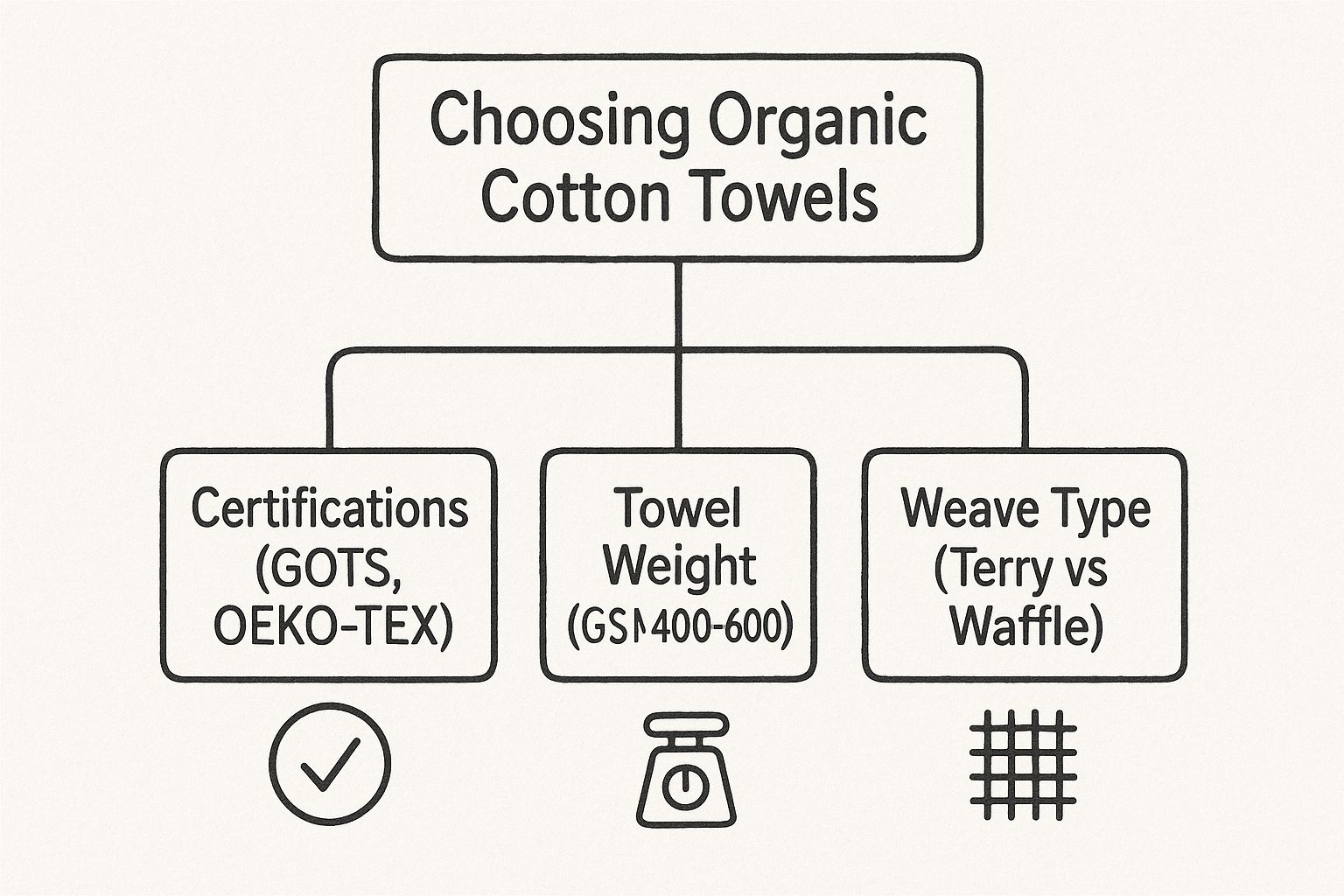
As you can see, certifications are the very foundation of a great towel, ensuring the raw materials and production methods meet strict criteria before you even get to factors like softness or absorbency.
GOTS: The Organic Gold Standard
The Global Organic Textile Standard (GOTS) is the top-tier certification for organic textiles. When you see this label, you know the product has passed the most comprehensive inspection possible.
GOTS certification means the entire journey, from the moment a cotton seed is planted to the finished towel you hold in your hands, has been verified as organic and ethical.
- From Seed to Shelf: It guarantees the cotton is grown without GMOs or toxic synthetic pesticides.
- Ethical Production: The standard enforces strict social criteria, ensuring fair wages and safe working conditions.
- Clean Processing: It bans harmful chemicals like toxic dyes and chlorine bleach during manufacturing.
A GOTS-certified towel isn't just a towel made from organic cotton; it's an authentically organic product through and through. It's the highest level of assurance you can get.
OEKO-TEX: The Consumer Safety Net
While GOTS audits the entire organic process, the OEKO-TEX Standard 100 certification zooms in on one critical thing: your safety. Think of it as a final, intensive health screening for your towel.
OEKO-TEX’s job is to test the finished textile for more than 100 known harmful substances, including lead, arsenic, carcinogenic dyes, and residual pesticides. If a product carries the Standard 100 label, every last thread, dye, and component has been tested and declared safe for human health.
This gives you incredible peace of mind, especially for something that touches your skin daily. It's why so many of us look for this label on everything from towels to baby clothes. To get the full picture, you can learn precisely what is OEKO-TEX certified in our dedicated guide.
GOTS vs. OEKO-TEX Standard 100 Comparison
So, how do these two powerhouses really stack up? While they are both incredibly valuable, they certify different things. This table breaks down the key differences.
| Certification | What It Certifies | Key Focus | Why It Matters for Towels |
|---|---|---|---|
| GOTS | The entire production process, from farming and harvesting to manufacturing. | Organic Integrity & Ethical Production | Guarantees your towel is made from 100% certified organic fibers and produced in a socially responsible way. |
| OEKO-TEX Standard 100 | The final, finished product and all of its components (thread, dye, etc.). | Consumer Safety & Harmful Substance Testing | Confirms that the towel you bring home is completely free from harmful chemicals and safe for your skin. |
Ultimately, seeing both labels on a towel is the ideal scenario. It's a powerful combination that tells you the product is not only made from genuinely organic fibers and produced ethically (GOTS) but has also been rigorously tested to be absolutely safe for you and your family (OEKO-TEX).
The Anatolico Difference: Artisan Craftsmanship

When you’re looking for the best organic cotton towels, the story doesn't end with certifications and weight ratings. The real magic often lies in the hands that make them. While big factories can pump out perfectly fine towels, there's an unmistakable quality that only comes from small-batch, artisan production. This is where a brand like Anatolico really shines.
Forget about giant, automated factory floors. This is a story about heritage. Anatolico is built on preserving traditional weaving techniques that have been passed down for generations. These time-tested methods, mastered by skilled artisans, result in towels with a character and durability that mass production just can't touch.
Every single thread is woven with purpose. This creates a tighter, more resilient fabric that not only feels amazing right out of the box but also gets better with every wash.
More Than a Towel, It’s a Tradition
Choosing a towel made by an artisan is about bringing a piece with a soul into your home. The subtle, tiny variations in the weave tell a story, giving each towel its own unique personality. You aren’t just buying something to dry off with; you're supporting a legacy of incredible skill.
- Small-Batch Production: Every towel is part of a limited run. This guarantees an incredible level of attention to detail that’s impossible to achieve on a massive scale.
- Generational Expertise: The weavers pour a lifetime of perfected skills into their work, creating a towel with unmatched structural integrity.
- A Connection to the Craft: This hands-on approach truly honors the premium organic cotton, turning it into a beautiful, functional piece of art.
By championing artisan craftsmanship, we connect modern living with timeless quality. It’s a conscious choice to move away from disposable goods and toward items that are made to be cherished and to last.
Supporting a Sustainable Ecosystem
This dedication to heritage goes hand-in-hand with sustainability. Small, family-like workshops create a responsible production environment where people and the planet are respected. It's a philosophy that lines up perfectly with organic farming, resulting in a product that's ethical from the cotton field all the way to your bathroom.
And people are noticing. The growing demand for thoughtfully made products is making a real impact. During the 2019/20 harvest season, farmers grew about 1,144,350 bales of organic cotton fiber worldwide. It's still a small piece of the pie, but its growth shows that shoppers are pushing for better textiles. You can dig deeper into these numbers and get the facts about organic cotton production to see the trend for yourself.
When you bring an Anatolico towel home, you’re getting more than just one of the best organic cotton towels on the market. You’re becoming part of a meaningful movement—directly supporting the artisans keeping these traditions alive and promoting a more mindful way of living, one beautiful towel at a time.
How to Care for Your Organic Cotton Towels
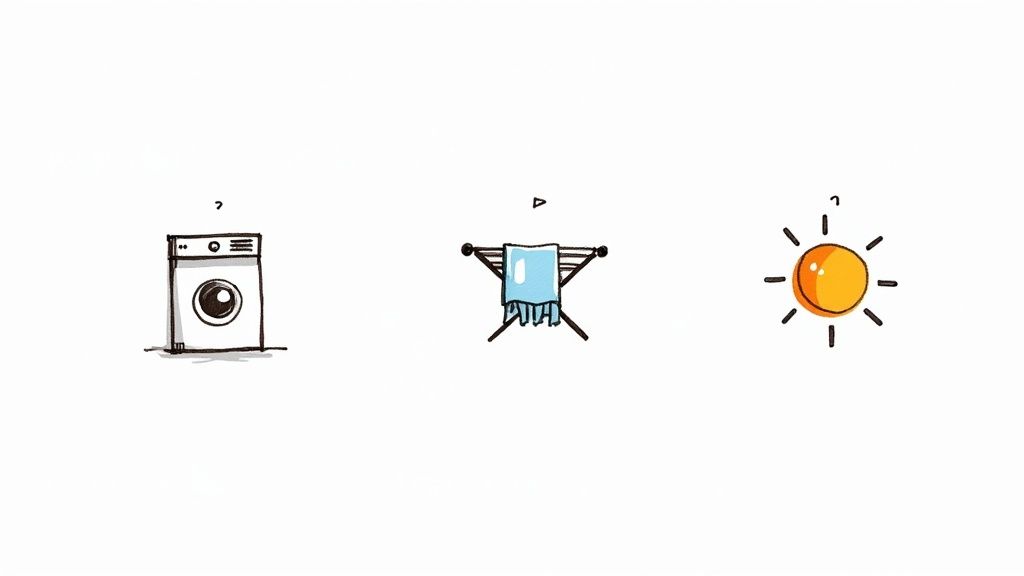
You’ve invested in some of the best organic cotton towels on the market, and you want them to stay soft, thirsty, and luxurious for years to come. The good news is, proper care isn't complicated. It’s mostly about avoiding a few common mistakes that can break down those beautiful organic fibers.
Think of it less as a chore and more as protecting an investment in your daily comfort. With the right approach, you can preserve that plush, brand-new feeling and prevent the stiff, scratchy texture that plagues lesser-quality towels.
The Dos and Don'ts of Washing
How you wash your towels is the single most important factor in their longevity. The key is to clean them effectively while being gentle enough to protect the fabric.
- Wash Before First Use: Always give new towels a wash before they hit the towel rack. This crucial first step removes any leftover lint from the weaving process and really "opens up" the cotton fibers to maximize their absorbency from day one.
- Use Warm, Not Hot, Water: While it might be tempting to blast them with hot water, high heat actually weakens and damages the delicate cotton fibers over time. A warm cycle is all you need to get them perfectly clean without causing unnecessary stress.
- Choose a Gentle Detergent: Stick with a mild, eco-friendly detergent. Harsh chemicals and even too much soap can leave behind a residue that stiffens the fabric and makes your towels less absorbent.
- Wash with Similar Items: Tossing towels in with clothes that have zippers, hooks, or velcro is a recipe for snags. Keep them separate to protect those fine, loopy threads.
The biggest mistake people make? Using fabric softener. I know it seems counterintuitive, but fabric softeners coat the cotton fibers with a waxy film. This coating actively repels water, destroying the very absorbency you bought the towel for.
Drying for Lasting Softness
How you dry your towels is just as crucial as how you wash them. The fastest way to turn a plush towel into a brittle one is by over-drying it.
For the best results, tumble dry on a low to medium heat setting. Here's a pro tip: pull them out of the dryer when they feel about 95% dry and let them air-dry the rest of the way. This simple step prevents the fibers from getting "baked" and stiff.
And if you ever spot a snagged loop, don't pull it! You'll just unravel the weave. Simply snip the snag off with a pair of scissors. For even more detailed advice, check out our complete guide on how to care for your Turkish towel—the tips in there apply to all high-quality cotton textiles.
While this guide covers your towels, maintaining a truly clean home sometimes means calling in the experts for other areas. You might explore other professional cleaning services for things like deep-cleaning carpets or upholstery. By following these simple steps, you'll ensure your organic cotton towels remain a small, daily luxury for a long, long time.
Making the Right Choice for Your Bathroom
So, how do you bring all this information together to choose the absolute best organic cotton towels for your home? It really boils down to a few key decisions that turn a simple purchase into one you’ll be happy with for years.
First, think about what you actually like in a towel. Are you someone who loves a thick, plush terry loop, or do you prefer the lightweight, quick-drying feel of a waffle weave? Match that with a GSM weight that delivers the right balance of softness and absorbency for your needs.
Next up are the non-negotiables: the certifications. Think of GOTS and OEKO-TEX as your personal quality inspectors. They are your proof that the towel you're buying is genuinely organic and completely free from harmful chemicals, all the way from the cotton field to your bathroom.
Finally, don't overlook the magic of true craftsmanship. There's a tangible difference in towels made in small batches by skilled artisans—they're not just built to last, but they carry a story of tradition and care.
Selecting premium organic towels is more than a bathroom upgrade. It is an investment in daily comfort, long-term durability, and a healthier lifestyle for you and your family.
This move towards quality and sustainability isn't just a niche trend; it's changing the whole game. The global bath towel market is currently valued at around USD 11.4 billion, a number that clearly shows more and more of us are prioritizing eco-conscious wellness at home.
If you're curious about the industry trends, you can discover more insights about the bath towel market on intellectualmarketinsights.com. With this knowledge, you’re ready to choose towels that don't just feel good, but that you can feel good about.
A Few Common Questions
Diving into the world of premium textiles can bring up some great questions. When you're on the hunt for the best organic cotton towels, a little extra insight goes a long way. Here are some straightforward answers to the things people often ask us.
Are Organic Cotton Towels Really Softer?
Yes, and the difference is something you can genuinely feel. The secret to that softness lies in the health of the cotton fibers themselves.
Conventional cotton farming often relies on harsh chemical defoliants to speed up harvesting. Unfortunately, these chemicals can make the delicate cotton fibers brittle and weak. Organic cotton, on the other hand, is usually picked by hand. This careful process protects the long, natural integrity of the fiber, which is exactly what gives you a towel that feels plusher and smoother against your skin.
Think of it like the difference between a dry, brittle twig and a fresh, supple branch. The healthier, undamaged organic fibers have a natural resilience and luxurious feel that actually gets better with every wash.
Why Do the Best Organic Cotton Towels Cost More?
That higher price tag is a direct reflection of a more considered and hands-on journey from the farm to your bathroom. It’s an investment in quality you can feel, ethical practices, and true sustainability.
Here’s a quick look at what goes into the cost:
- Thoughtful Farming: Organic farming is simply more labor-intensive. It skips the cheap synthetic pesticides and fertilizers, opting instead for natural, time-tested methods like crop rotation and composting.
- Serious Certifications: Earning a GOTS certification isn’t easy. It involves expensive audits and a commitment to strict environmental and fair labor practices across the entire supply chain.
- Built to Last: Ultimately, you’re getting a towel that is more durable. Because it's made from stronger fibers, it will hold up far longer, meaning you won’t be replacing it anytime soon.
When you buy organic, you're paying for a product that’s better for the planet, kinder to the people who make it, and healthier for your home.
What's the Difference Between Organic Cotton and Turkish Cotton?
This is a fantastic question, as it gets to the heart of what makes a towel truly exceptional. These two terms actually describe different things. "Turkish" refers to the cotton's origin—specifically, the prized long-staple fibers from the Aegean region, which are legendary for creating towels that are both incredibly absorbent and strong. "Organic," on the other hand, refers to the farming method.
The absolute best towels are a marriage of the two. You can have a conventional Turkish cotton towel that was grown using pesticides. But a GOTS-certified organic Turkish cotton towel? That’s the gold standard. You get the premium, long-staple fibers celebrated for their quality, all grown and processed without a trace of harmful chemicals. It’s the pinnacle of safety and luxury.
At Anatolico, we believe true luxury is found where quality, craftsmanship, and sustainability meet. Our small-batch Turkish towels are woven by master artisans using only the finest OEKO-TEX certified materials, bringing timeless Mediterranean comfort right into your home. Discover the difference at https://www.anatolico.co.

